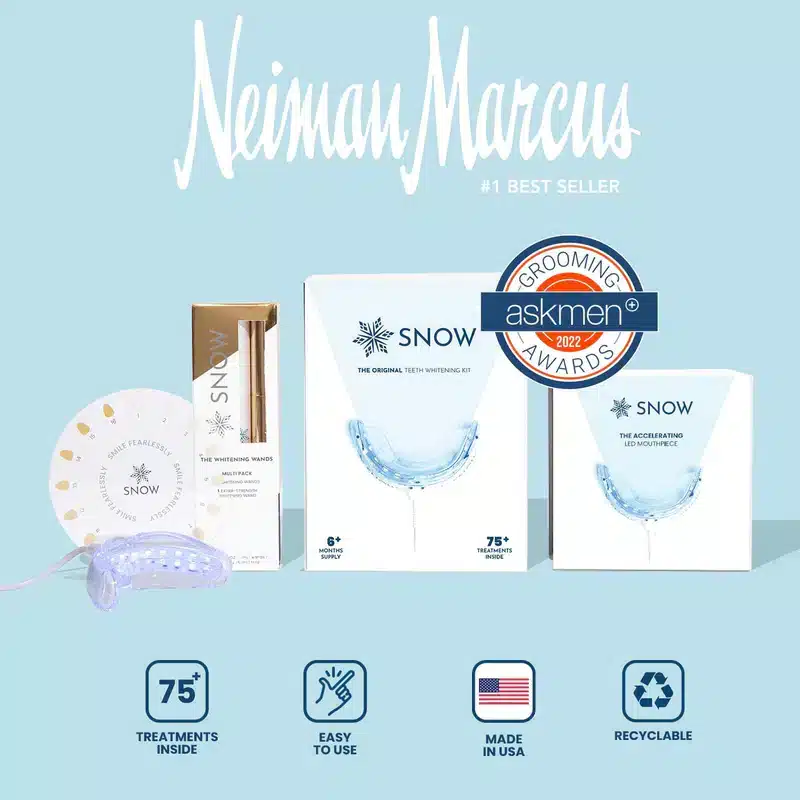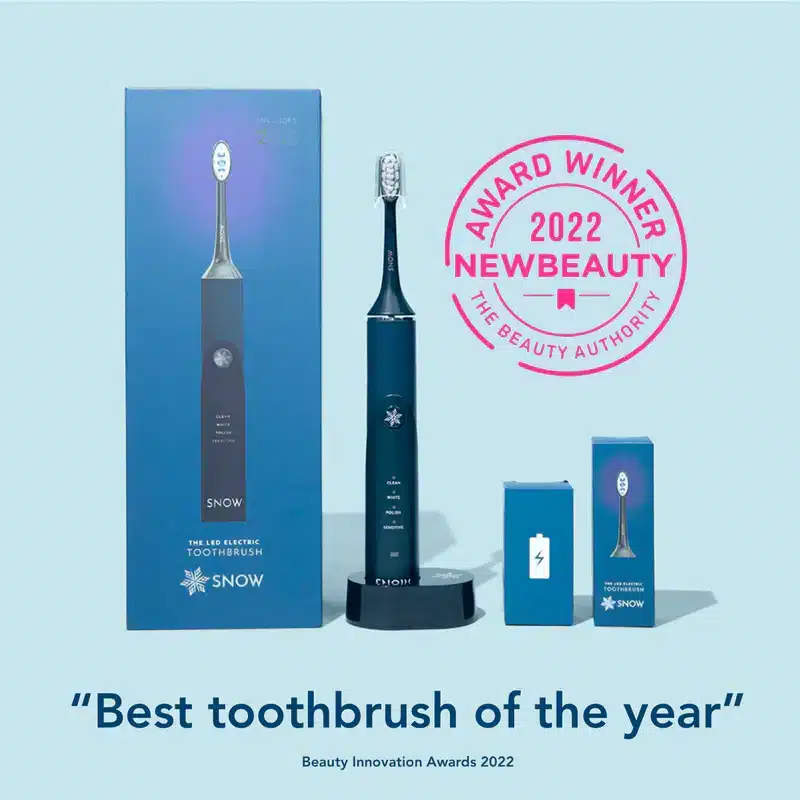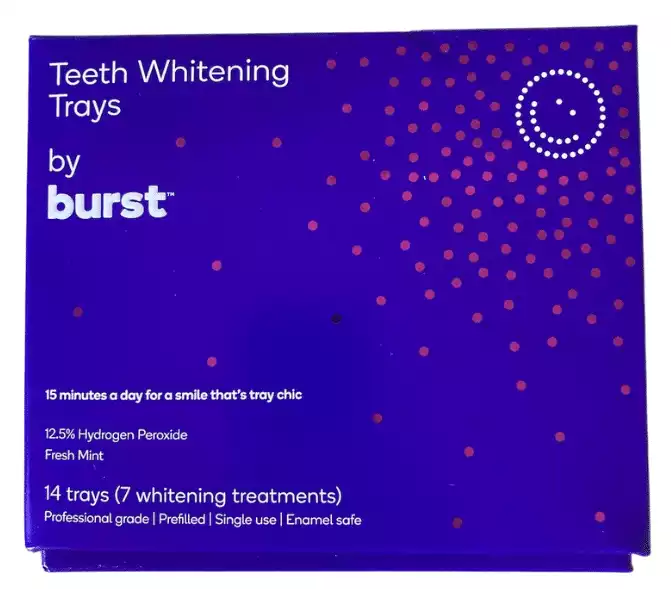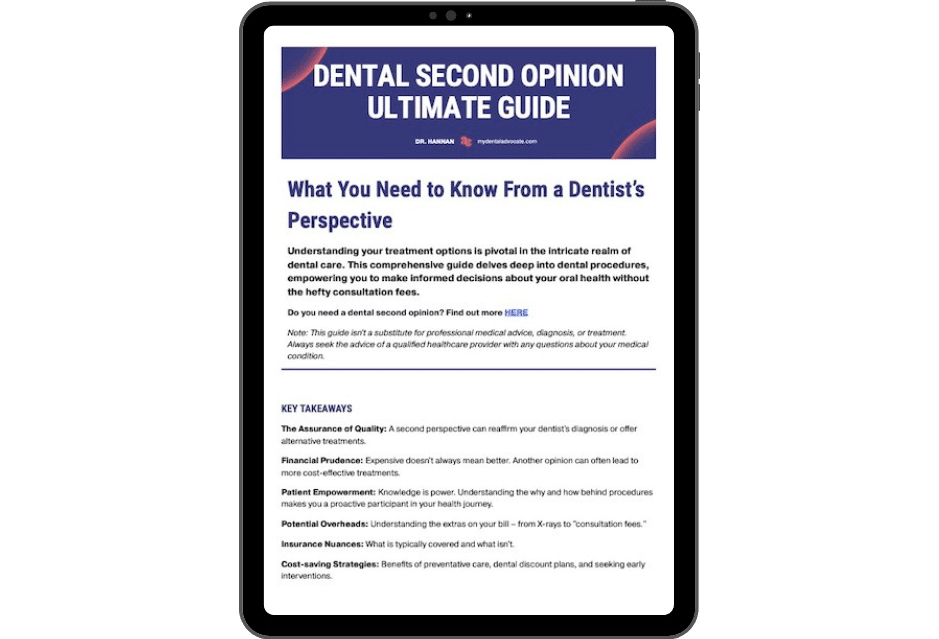The Truth About Fluoride and Teeth Whitening (Dentist’s Perspective)
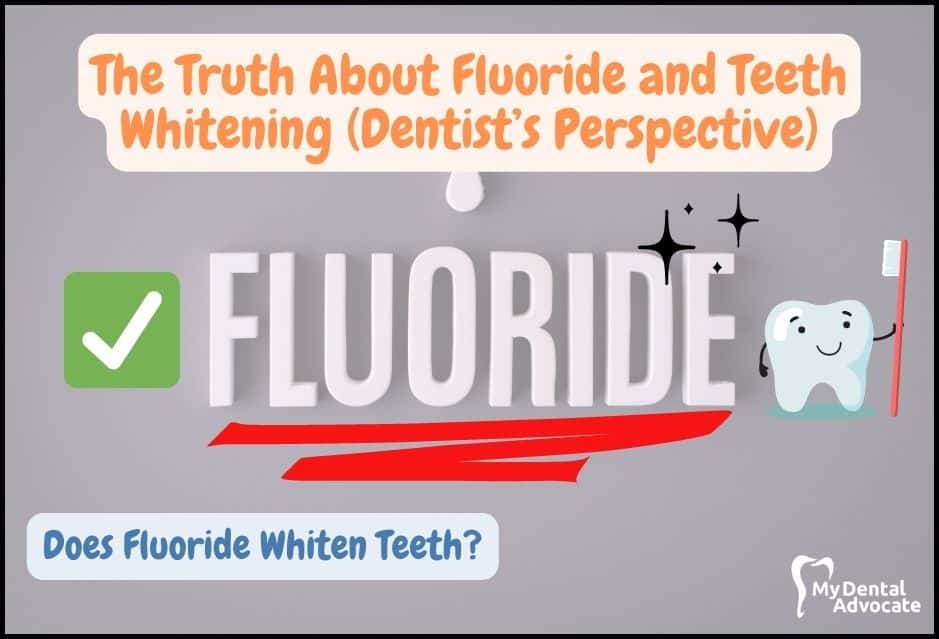
As a dentist, I often get asked if fluoride can whiten teeth. Unfortunately, the short answer is no; fluoride cannot directly whiten teeth.
However, it does have many benefits for oral health and can contribute to a brighter smile.
In this article, I’ll explain fluoride and its role in maintaining a healthy and white smile from a dentist’s perspective.
Recommended Reading: Dental fluoride | The Ultimate GuideNeed Dental Advice? Ask Dr. Hannan!
What Is Fluoride?
Fluoride is a mineral that occurs naturally in our environment.
However, we consume it in small amounts through drinking water and certain foods. In addition, fluoride is also added to toothpaste and mouthwash to help prevent tooth decay.
The most significant benefit of fluoride is that it can strengthen tooth enamel and make it more resistant to acid attacks. However, too much of anything is not good.
Excess fluoride can cause white spots on teeth, called fluorosis.
In addition, some people may be allergic to fluoride. Therefore, as advised by your dentist, it’s important to use fluoride in the right amount to prevent tooth decay and maintain a healthy and white smile.
Recommended Reading: Fluoride Varnish vs. Fluoride Treatment (What’s the difference?)Also, it’s important to note that too much fluoride can lead to poisoning, also called toxicity.
In addition to toothpaste, fluoride is applied to mouthwash to help prevent tooth decay. When fluoride bathes your teeth in a liquid or semisolid form, it can repair weakened tooth enamel and make it more resistant to acid attacks from plaque, bacteria and sugars in the mouth.
The American Academy of Paediatric Dentistry (AAPD) recommends a preventive topical use of fluoride supplements because of their cariostatic effect.
Does Fluoride Whiten Teeth?
Fluoride cannot directly whiten teeth. However, it can help prevent tooth discoloration caused by plaque buildup, cavities, and tooth decay.
A healthy mouth with strong enamel is less likely to develop discoloration in the first place, leading to a brighter smile.
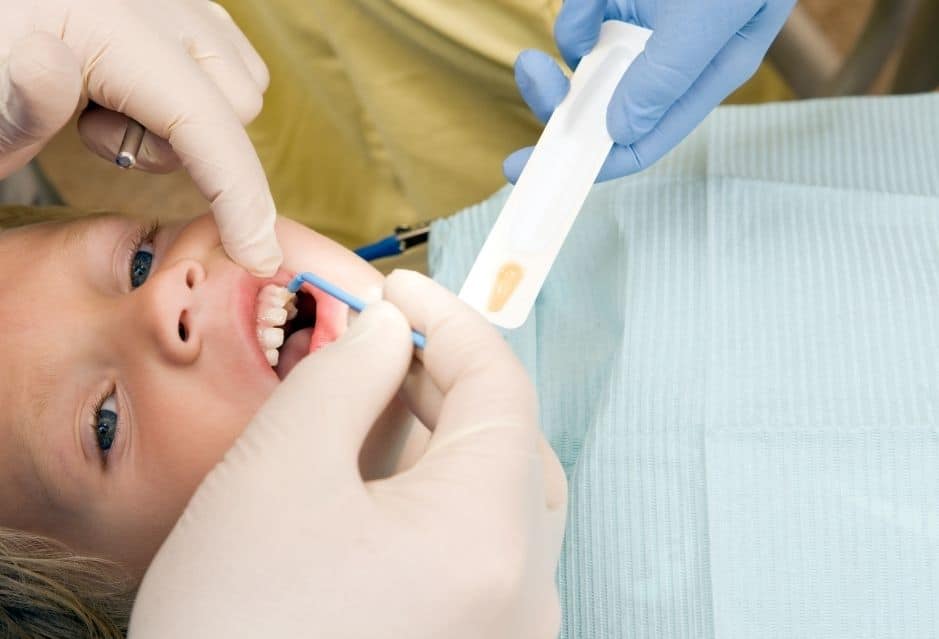
Fluoride Benefits
- Reduces tooth decay and cavities
- Strengthens tooth enamel
- Prevent teeth from acid attacks
- Prevent tooth discoloration
- Heal tooth sensitivity
- Prevent tooth sensitivity
Fluoride Risks
- Excess fluoride can lead to fluorosis
- Potential white spots on teeth
- Possible allergy to fluoride, including itching or rash
Understanding Teeth Whitening
Teeth whitening is a popular cosmetic dentistry procedure that can help to improve the appearance of discolored or stained teeth.
As a dentist, I often recommend teeth whitening to patients who want to enhance their smile.
Key Factors
- Teeth whitening can be done in-office or at home using over-the-counter products. In-office treatments are typically more effective and can be completed in one visit, while at-home treatments may take several weeks to produce visible results. I recommend SNOW at-home teeth whitening kit.
- The most common type of teeth whitening is done using hydrogen peroxide or carbamide peroxide as the active ingredient. These bleaching agents break down the pigments that cause discoloration in the tooth enamel.
- Teeth whitening is safe when done under the supervision of a dentist. However, it can cause tooth sensitivity and gum irritation in some patients. Use fluoride toothpaste two weeks before treatment to decrease tooth sensitivity.
- Teeth whitening is not permanent, and the results can vary depending on the individual. It’s essential to maintain good oral hygiene and avoid foods and drinks that can stain the teeth to prolong the whitening treatment’s effects.
- Teeth whitening may not suit everyone, particularly those with sensitive teeth, gum disease or cavities. A consultation with a dentist is necessary to determine if teeth whitening is an appropriate option for you.
- Teeth whitening can help to improve the appearance of discolored or stained teeth, but it is not a substitute for good oral hygiene and regular dental check-ups.
Best Whitening Products
SNOW's bestselling teeth whitening kit combines their advanced whitening serum with LED light technology for professional-level results. Whiten your teeth in as little as 9 minutes a day.
Formulated with expert cosmetic dentist Dr. Brian Harris. Their teeth whitening kit protects your pearly whites while removing tough surface stains. Recommend by 9 out of 10 dentists (DentalAdvisor).
Deep stains don’t stand a chance. Their advanced proprietary whitening gel formula erases stains, fast. We use the same active ingredients as dentists. Their teeth whitening products are powered by hydrogen peroxide and carbamide peroxide.
These powerful whitening agents combined with LED light provide the ultimate whitening solution.
Meet the 2022 NEW BEAUTY® Award Winner!
Equipped with blue LED light for whitening support and sonic technology for better cleaning, this toothbrush leaves your smile whiter and brighter.
And, with 4 unique modes, your new toothbrush customizes each brushing session to exactly what you need: Clean, Whiten, Polish, and Sensitive.
Custom-fit feel trays visibly brighten smiles in 15 minutes daily, with dramatic results after just 1 week.
Created by hygienists and dentists and formulated with 12.5% hydrogen peroxide for professional-grade whitening. All 7 treatments come prefilled and ready to work their magic. No more whitening guesswork!
Clean, vegan, ingredients that are gentle on enamel but tough on stains. Whitens up to 6 shades in just 7 days.*
Fluoride & Tooth Sensitivity
Did you know that fluoride is excellent at preventing tooth sensitivity fluoride can help prevent tooth sensitivity when whitening teeth or for those that suffer from daily sensitivity.
Tooth sensitivity is a common side effect of teeth whitening treatments, as the bleaching agents can cause the tiny tubules in the teeth to open up, leading to increased sensitivity to temperature changes and sweet, sour or acidic foods.
Fluoride works to “clog” tiny tubules preventing a trigging response to the nerve.
A recent American Dental Association Journal study found that fluoride toothpaste effectively reduced tooth sensitivity after bleaching treatments.
In addition, the study found that fluoride gel applied to teeth before whitening treatments reduced tooth sensitivity.
Importantly, fluoride should be used with other oral care measures and should not be used as a sole solution for preventing tooth sensitivity. Instead, it’s best to consult with a dentist to determine the best treatment for preventing tooth sensitivity when whitening teeth.
Recommended Reading: Best Sensitive Gums Mouthwash Review 2024
Research Statistics
- Fluoride gel applied before and after bleaching treatment reduced tooth sensitivity by 50%.
- Fluoride gel applied after bleaching treatment reduced tooth sensitivity by 34%.
- Fluoride gel applied alone, without bleaching treatment, had no significant effect on reducing tooth sensitivity.
Frequently Asked Questions (FAQ)
My Experience & Expertise
Fluoride does not directly whiten teeth. However, strengthening tooth enamel and preventing tooth discoloration can contribute to a brighter smile.
As a dentist, I recommend using fluoride toothpaste and mouthwash as part of a daily oral care routine. But it’s essential to be mindful of the fluoride intake. Therefore, it’s always best to consult your dentist regarding the appropriate use of fluoride for your specific needs.
Need a second opinion? We can help! Learn more. Knowledge is power when cultivating healthy dental habits. The more informed you are, the better positioned you’ll be to prevent avoidable and potentially costly dental procedures for you and your family. Watch for future blog posts, where we’ll continue sharing important information, product reviews and practical advice!
Sources
- Kanduti D. FLUORIDE: A REVIEW OF USE AND EFFECTS ON HEALTH. Mater Sociomed. 2016.
- Meyer J. Consequences of community water fluoridation cessation for Medicaid-eligible children and adolescents in Juneau, Alaska. BMC Oral Health. 2018.
- Creeth J. Three randomized studies of dentine hypersensitivity reduction after short-term SnF2 toothpaste use. J Clin Periodontol. 2019.

About the Author
Dr. Matthew Hannan, also known as “Dr. Advocate,” is a board-certified dentist on a mission to provide accurate dental patient education. He attended Baylor University before completing dental school at UT Health San Antonio School of Dentistry. He now lives in Arizona with his beautiful wife and 4 kids. Dr. Hannan believes everyone should access easy-to-read dental resources with relevant, up-to-date dental research and insight to improve their oral health.

Connect with Dr. Hannan!

Baby Teething (Signs, Symptoms & Solutions)
Irritable babies drooling excessively and gnawing on their hands may be teething. Teething occurs when baby teeth erupt and can be uncomfortable for little ones. In addition, it can be incredibly stressful for parents and caregivers…
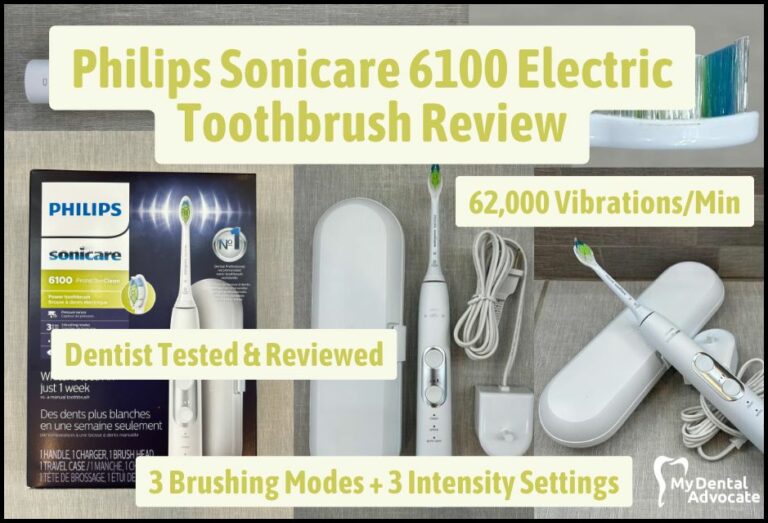
Philips Sonicare 6100 Electric Toothbrush Review 2024
As soon as I received the Philips Sonicare 6100 electric toothbrush, I was immediately taken in by the sleek, well-designed packaging, signaling a high-quality product. Philips has put a lot of thought into the user experience right from the moment of unboxing.
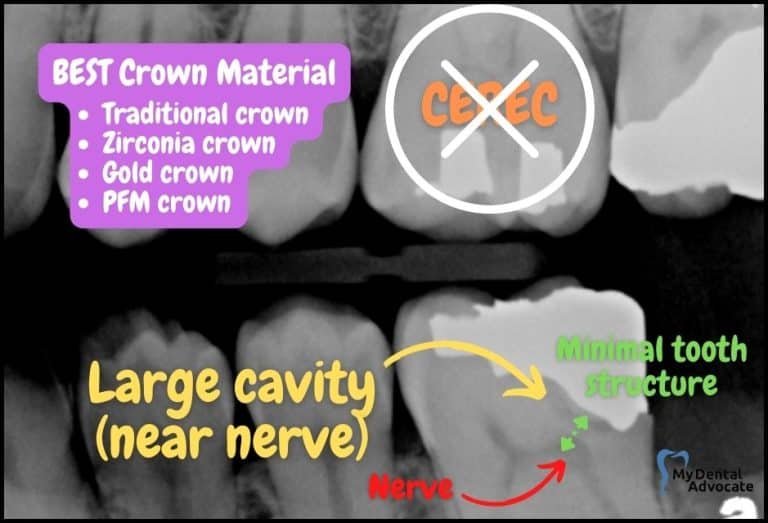
When Are CEREC Crowns Not Recommended? (Top 6 Reasons)
CEREC crowns have become a popular way to restore teeth in recent years. However, there are some occasions when CEREC crowns are not recommended. From a dentist’s perspective, we will discuss the top 6 reasons…
Gain Clarity with Our FREE Second Opinion Guide
Receive clear, expert second opinions online within 48 hours. Start today!
Product Reviews
Our 250+ dental product reviews (and counting), curated by an experienced dentist, are the most comprehensive online.
Toothbrush Genie
State-of-the-art chatbot designed to help you discover your perfect toothbrush in just a few simple steps!
Cavity Risk Assessment
Cutting-edge digital tool designed to evaluate your individual cavity risk based on your responses to a series of questions.
Gum Disease Assessment
Discover your gum disease risk with our quick and engaging 6-question assessment!


